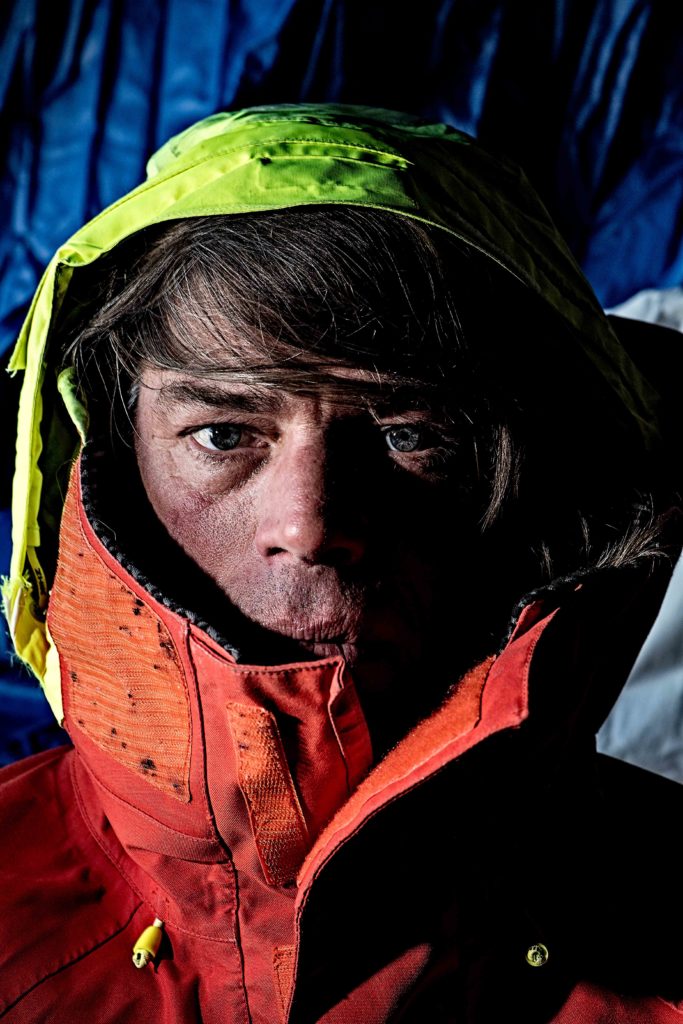Born to Sail
From transatlantic sails to surviving a shipwreck, Rob Windsor has made a career out of his love of sailing
Rob Windsor has sailed across the Atlantic Ocean nearly a dozen times, usually with just one other person on board. A professional sailor based in Portland, Windsor specializes in racing Class 40 vessels, which are 40-foot-long boats designed to be sailed by one or two people. When he’s not sailing, he helps prepare other sailors and their vessels for trips, including some solo sailors circumnavigating the globe. However, his schedule this summer is uncertain, with many races being canceled because of the coronavirus pandemic, including his favorite: the Atlantic Cup. The race, held every two years, covers the more than 1,000 miles from Charleston, South Carolina, to New York City to Portland, where it concludes with in-shore racing around Casco Bay. “These boats are made to go in a straight line for a really long time,” Windsor says. “They’re not made to be zipping around Fort Gorges and doing a lot of twists and turns. It’s kind of like trying to take a NASCAR race car and doing a slalom course with it.”
Is it nerve-wracking being out in the middle of the ocean with just one other person?
Honestly, being in the middle of the ocean is a lot easier than sailing in Casco Bay. In Casco Bay you’ve got rocks and buoys and boats, and there are shallow spots. In the middle of the ocean, there really isn’t anything to run into. It’s much easier to look after yourself and the boat, because you’re going in a straight line for a couple thousand miles. I think a lot of people get nervous because you’re far away from help, which is totally true. But if you know what you’re doing and you take care of your boat and yourself, it’s really quite nice.
What do you have to do to prepare for a transatlantic trip?
A transatlantic trip takes between 10 and 15 days if you want to sail from Maine to England. But the preparation for that is months of making sure that everything on the boat is in good working order. Things get replaced and changed and fine-tuned. We have to prepare for how long we think it’s going to take so we bring enough food. Some of the boats have desalination, so we can make our own water from saltwater, but some don’t, so we need to figure out how much water we’re going to need to bring with us. And the weather is a big deal. We try to look at a really good window of weather, where we’re going to not sail into a hurricane or do anything not safe. That takes a long time to figure out.

“I was on a catamaran
that cracked in half
and sank 300 miles
off North Carolina.”
Have you been in any bad weather in the middle of the ocean?
I was on a catamaran that cracked in half and sank 300 miles off North Carolina. We got picked up by the U.S. Coast Guard. I’m only alive today because of them. We had thought we had a really good window to go from Saint Thomas in the Virgin Islands to Annapolis, Maryland. And about eight days in, we got caught in a really nasty spring storm. The waves got really big, and the boat came apart. The port side of the boat cracked, and we had to set off the emergency locator beacon and get rescued by the Coast Guard.
That sounds terrifying.
You know, it’s funny. Everybody says that, and it wasn’t scary until I had to get off the boat. The boat didn’t just sink from underneath us. Boats take a long time to go down. And when I had to jump off the boat, which was broken and sinking into the water, and paddle over to the rescue swimmer coming down from the helicopter, that was the only time it was really scary. The rest of it was kind of in survival mode and trying to make sure that we were all safe.
How big were the waves?
The Coast Guard said that the waves were 40 feet. On a regular day at Higgins Beach, let’s say, the waves are 3 or 4 feet. And if you wade out a little bit and you stand there and let one hit you, it’ll knock you over. And so, multiply that by more than ten times. That’s how big they were. They were huge. Impressively big.
Do close calls like that ever discourage you from continuing to sail?
Never. We got back to the United States on a Wednesday, and I was out racing on Saturday. I think when bad things happen the best thing to do is to get right back out there. To be honest with you, it wasn’t super terrifying. I know it sounds ridiculous, but it wasn’t. I was upset that bad things happened, but at the same time sailing is my favorite thing to do in the whole world, and somebody pays me to do it.




